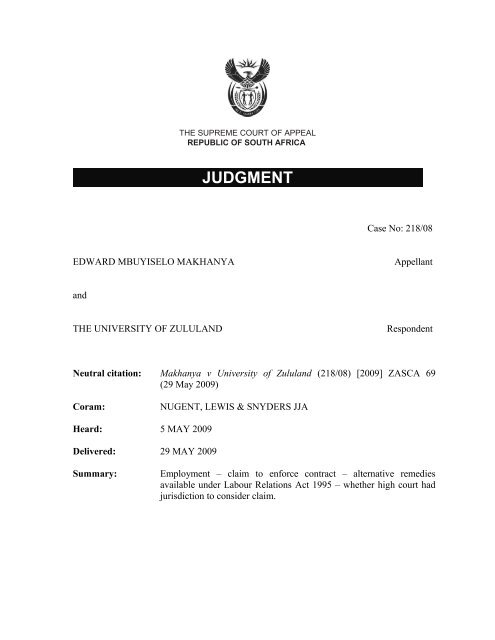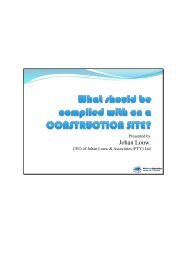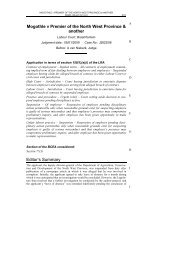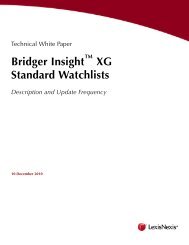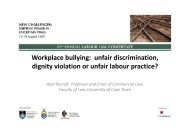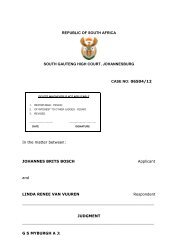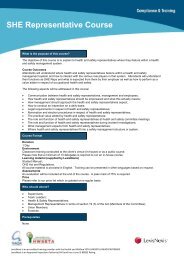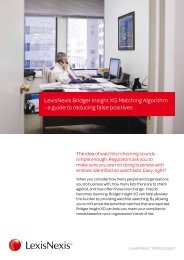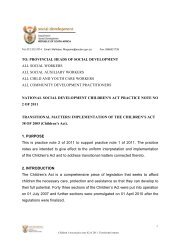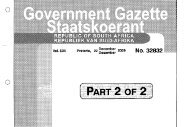Makhanya v University of Zululand - LexisNexis South Africa
Makhanya v University of Zululand - LexisNexis South Africa
Makhanya v University of Zululand - LexisNexis South Africa
You also want an ePaper? Increase the reach of your titles
YUMPU automatically turns print PDFs into web optimized ePapers that Google loves.
THE SUPREME COURT OF APPEALREPUBLIC OF SOUTH AFRICAJUDGMENTCase No: 218/08EDWARD MBUYISELO MAKHANYAAppellantandTHE UNIVERSITY OF ZULULANDRespondentNeutral citation: <strong>Makhanya</strong> v <strong>University</strong> <strong>of</strong> <strong>Zululand</strong> (218/08) [2009] ZASCA 69(29 May 2009)Coram:NUGENT, LEWIS & SNYDERS JJAHeard: 5 MAY 2009Delivered: 29 MAY 2009Summary:Employment – claim to enforce contract – alternative remediesavailable under Labour Relations Act 1995 – whether high court hadjurisdiction to consider claim.
2________________________________________________________________ORDER________________________________________________________________On appeal from: High Court Durban (Hugo J sitting as court <strong>of</strong> firstinstance)1 The appeal is upheld with costs. The order <strong>of</strong> the court below is setaside and the following orders are substituted:‘(a) Both special pleas are dismissed with costs.(b) The action is postponed sine die for disposal <strong>of</strong> the remaining issues’.2 The matter is remitted to the high court._____________________________________________________________________JUDGMENT_____________________________________________________________________NUGENT JA (LEWIS and SNYDERS JJA CONCURRING)[1] Pr<strong>of</strong>essor <strong>Makhanya</strong> instituted an action against the <strong>University</strong> <strong>of</strong><strong>Zululand</strong> in the High Court at Durban. The particulars <strong>of</strong> claim werestraightforward. <strong>Makhanya</strong> said that he had been employed by the<strong>University</strong> under a contract <strong>of</strong> employment. He said that the <strong>University</strong> hadpurported to terminate the contract in breach <strong>of</strong> its terms. Thatnotwithstanding, said <strong>Makhanya</strong>, he had continued to render his services, orat least he had tendered to do so. But the <strong>University</strong> had not paid him hisremuneration and other moneys to which the contract entitled him, and heclaimed orders compelling it to do so. (Two separate claims were made but
4[4] Whatever explanation is given invariably leads one back to thedecision <strong>of</strong> the Constitutional Court in Chirwa v Transnet Ltd, 3 in which themajority expressed the view that the high court had no jurisdiction toconsider the claim in that case. I will return to that decision in some detaillater in this judgment.[5] This case is not materially different to Chirwa – I will expand uponthat later in this judgment – and any attempt to distinguish them on theirfacts would be no more than a makeweight. That is the difficulty that nowconfronts us. On the one hand Fedlife (which seems to have had theapproval <strong>of</strong> that court) and the BCEA make it clear that the high court hasjurisdiction in this case. On the other hand if we are bound to apply the viewexpressed by the majority in Chirwa then we must reach the oppositeconclusion.[6] The doctrine <strong>of</strong> precedent, which requires courts to follow thedecisions <strong>of</strong> coordinate and higher courts, as Cameron JA said in this courtin True Motives 84 (Pty) Ltd v Mahdi, 4 is an intrinsic feature <strong>of</strong> the rule <strong>of</strong>law, which is in turn foundational to our Constitution. He went on to say:‘Without precedent there would be no certainty, no predictability and no coherence. Thecourts would operate in a tangle <strong>of</strong> unknowable considerations, which all too soon wouldbecome vulnerable to whim and fancy. Law would not rule. The operation <strong>of</strong> precedent,and its proper implementation, are therefore vital constitutional questions.’[7] He pointed out that ‘at this tender stage <strong>of</strong> our legal development, thedoctrine <strong>of</strong> precedent has special importance’ and warned that ‘this court32008 (4) SA 367 (CC); [2007] ZACC 23.4[2009] ZASCA 4 para 100.
5should not lay itself open to the … complaint that it is violating the rule <strong>of</strong>law by illegitimately disregarding or evading [Constitutional Court]precedents’. 5 But he also observed that:‘it is well established that precedent is limited to the binding basis (or ratio decidendi) <strong>of</strong>previous decisions. The doctrine obliges courts <strong>of</strong> equivalent status and those subordinatein the hierarchy to follow only the binding basis <strong>of</strong> a previous decision. Anything in ajudgment that is subsidiary is considered to be ‘said along the wayside’, or ‘stated as part<strong>of</strong> the journey’ (obiter dictum), and is not binding on subsequent courts.’ 6[8] The law does not exist in discrete boxes, separate from one another.While its rules as they apply in various fields are <strong>of</strong>ten collected togetherunder various headings, that is for convenience <strong>of</strong> academic study andtreatment, and should not be allowed to disguise the fact that the law is aseamless web <strong>of</strong> rights and obligations that impact upon one another acrossthose fields. If the ratio <strong>of</strong> Chirwa is as I have stated it, as the court belowconsidered it to be, then the majority must be taken to have implicitlyoverruled the decision in Fedlife. And the express reservation in the BCEA<strong>of</strong> the ordinary power <strong>of</strong> a high court to consider contractual claims wouldneed in some way to be explained. And the question would arise as to whatfurther limitations it might impose on the ordinary power <strong>of</strong> the high courtsin other cases. And so it could go on, because a domino that falls usually sets<strong>of</strong>f a cascade.[9] Apart from its jurisdictional finding the majority in Chirwa also foundthat the claim was bad in law. What is most striking about that case is thatthe two findings are mutually destructive and cannot both have provided the5Para 102.6Para 101.
6ratio for the order that was made. I deal with that more fully later but for themoment I need only say that if the high court (and by extension the court onappeal) had no jurisdiction in the matter then that ought to have been an end<strong>of</strong> the matter: by its own decision it would have had no power to dismiss theclaim on its merits. Conversely, if the ratio for the order was that the claimwas bad in law, it follows that it must have had the power to make thatfinding. The ratio may be one or the other but it cannot be both.[10] For those reasons I think that we must be most circumspect beforeaccepting without question that that was indeed the ratio <strong>of</strong> Chirwa, therebytaking this court along a path that it has not taken before, and for the properdisposal <strong>of</strong> this appeal we cannot avoid enquiring into that question. Thatenquiry seems to me to be best undertaken by starting with first principles,which I do before turning to the decision in that case.HOW THE PROBLEM ARISES[11] The LRA creates certain rights for employees that include ‘the rightnot to be unfairly dismissed and [not to be] subjected to unfair labourpractices’. 7 I will refer to those rights interchangeably as ‘LRA rights’. Yetemployees also have other rights, in common with other people generally,arising from the general law. One is the right that everyone has (a rightemanating from the common law) to insist upon performance <strong>of</strong> a contract.Another is the right that everyone has (a right emanating from theConstitution and elaborated upon in the Promotion <strong>of</strong> Administrative JusticeAct) to just administrative action. 87Section 185.8Section 33(1) <strong>of</strong> the Bill <strong>of</strong> Rights: ‘Everyone has the right to administrative action that is lawful,reasonable and procedurally fair.’ The Interim Constitution provided a right in comparable terms in s 24.
7[12] Thus there is the potential (I emphasise that I refer only to thepotential) for three separate claims to arise when an employee’s contract isterminated. One is for infringement <strong>of</strong> his or her LRA right. Another is forinfringement <strong>of</strong> his or her common law right. And where it occurs in thepublic sector, a third is for infringement <strong>of</strong> his or her constitutional right.[13] An LRA right is enforceable only in the Commission for Conciliation,Mediation and Arbitration (CCMA) 9 or in the Labour Court. 10 (I will refer tothem interchangeably as the ‘Labour Forums’ except where it becomesnecessary to distinguish them). The common law right is enforceable in thehigh courts 11 and in the Labour Court. 12 And the constitutional right isenforceable in the high courts 13 and in the Labour Court. 14[14] It is convenient to pause for a moment to make an observation withregard to the enforceability in the high court <strong>of</strong> that constitutional right.There is some suggestion in the judgment <strong>of</strong> Ngcobo J in Chirwa thats 157(2) <strong>of</strong> the LRA might somehow have divested the high courts <strong>of</strong> their9Created by s 112 <strong>of</strong> the LRA.10So far as disputes fall within the jurisdiction <strong>of</strong> the CCMA the exclusivity <strong>of</strong> its powers is implicit in theprocedures for resolution <strong>of</strong> such disputes. As for the Labour Court, s 157(1) <strong>of</strong> the LRA provides: ‘…[T]he Labour Court has exclusive jurisdiction in respect <strong>of</strong> all matters that elsewhere in terms <strong>of</strong> this Act …are to be determined by the Labour Court.’ (see Fedlife, above, on the meaning <strong>of</strong> that subsection, approvedin Fredericks v MEC for Education and Training, Eastern Cape 2002 (2) SA 693 (CC)).11Section 169(b) <strong>of</strong> the Constitution. The section assigns judicial authority to the high courts in thefollowing terms:‘A High Court may decide –(a) any constitutional matter except a matter that:(i) only the Constitutional Court may decide; or(ii) is assigned by an Act <strong>of</strong> Parliament to another court <strong>of</strong> a status similar to a High Court; and(b) any other matter not assigned to another court by an Act <strong>of</strong> Parliament.12Section 77(3) <strong>of</strong> the Basic Conditions <strong>of</strong> Employment Act: ‘The Labour Court has concurrent jurisdictionwith the civil courts to hear and determine any matter concerning a contract <strong>of</strong> employment …’13Section 169(a)(ii) quoted above.14Section 157(2) <strong>of</strong> the LRA: ‘The Labour Court has concurrent jurisdiction with the High Court in respect<strong>of</strong> any alleged or threatened violation <strong>of</strong> any fundamental right entrenched in Chapter 2 <strong>of</strong> the[Constitution] and arising from … employment and from labour relations.’
8ordinary power to consider claims to enforce a constitutional right arisingfrom employment (the claim that was made in Chirwa) 15 and in that contextit was suggested that the use <strong>of</strong> the word ‘concurrent’ in s 157(2) might havebeen unfortunate. 16 That suggestion might be founded upon a misconceptionand I do not think it can be correct.[15] The section so far as it is now relevant reads as follows:‘157 Jurisdiction <strong>of</strong> Labour Court(1) Subject to the Constitution and section 173, and except where this Act providesotherwise, the Labour Court has exclusive jurisdiction in respect <strong>of</strong> all matters thatelsewhere in terms <strong>of</strong> this Act or in terms <strong>of</strong> any other law are to be determined by theLabour Court.(2) The Labour Court has concurrent jurisdiction with the High Court in respect <strong>of</strong>any alleged or threatened violation <strong>of</strong> any fundamental right entrenched in Chapter 2 <strong>of</strong>the Constitution <strong>of</strong> the Republic <strong>of</strong> <strong>South</strong> <strong>Africa</strong>, 1996, and arising from –(a) employment and from labour relations…’[16] It is important to bear in mind that s 157(2) does not purport to conferjurisdiction on the high courts. The power to consider claims for the allegedviolation <strong>of</strong> constitutional rights, whether in the employment sphere orotherwise, is assigned to them by the Constitution. Section 157(2) does nomore than to confer equivalent jurisdiction upon the Labour Court.[17] A statute that confers power on a special court might <strong>of</strong>ten sayexpressly that it is to be exercised ‘concurrently’ so as to remove ambiguity.But in s 157, in which the conferring <strong>of</strong> exclusive and concurrent jurisdictionis dealt with in separate subsections, there is no room for ambiguity, and theword ‘concurrent’ is superfluous. A construction <strong>of</strong> subsection (2) that15Paras 122-123.16Paras 121 and 122.
9divests the high courts <strong>of</strong> their ordinary power in such matters, and assigns itto the Labour Court exclusively, would require a major rewriting <strong>of</strong> thesection as a whole, and not merely the deletion <strong>of</strong> the word ‘concurrent’. 17 Itwould mean that subsection (2) as a whole is superfluous, and would alsocall for subsection (1) to be rewritten so as to assign that power exclusivelyto the Labour Court. The section simply does not open itself, by any form <strong>of</strong>interpretation, to being reconstructed in that way. The section clearlyrecognises the existence <strong>of</strong> the high court’s original jurisdiction in suchmatters and merely extends it to the Labour Court as well.[18] Thus to summarise:• The Labour Forums have exclusive power to enforce LRA rights (tothe exclusion <strong>of</strong> the high courts).• The high court and the Labour Court both have the power to enforcecommon law contractual rights.• The high court and the Labour Court both have the power to enforceconstitutional rights so far as their infringement arises fromemployment.[19] I turn to what happened in this case. In consequence <strong>of</strong> the termination<strong>of</strong> his employment <strong>Makhanya</strong> at first pursued a claim for infringement <strong>of</strong> hisLRA right in the CCMA where it ultimately failed (I elaborate upon thatlater). The <strong>University</strong> now alleges that because <strong>Makhanya</strong> pursued a claimfor enforcement <strong>of</strong> his LRA right (in the CCMA) the high court has nopower to consider his claim for enforcement <strong>of</strong> his contractual right.17Even the deletion <strong>of</strong> the words ‘concurrent … with the High Court’ would not alter the meaning <strong>of</strong>subsection (2) when properly construed in the context <strong>of</strong> the section as a whole.
10[20] Much the same happened to Ms Chirwa, who was employed in thepublic sector. When Transnet terminated her employment Ms Chirwa at firstpursued a claim for infringement <strong>of</strong> her LRA right in the CCMA (she did nottake it to conclusion but that is not material). She then instituted a claim inthe high court for infringement <strong>of</strong> her constitutional right. It was because MsChirwa had pursued a claim for enforcement <strong>of</strong> her LRA right (in theCCMA) that the majority concluded, as I understand it, that the high courthad no power to consider her claim for enforcement <strong>of</strong> her constitutionalright.[21] But for the fact that the right that was asserted in each case wasdifferent – which is not material to the jurisdictional issue – the two casesare materially indistinguishable. It seems to me that what has confusedmatters in both cases is that a claim for enforcement <strong>of</strong> an LRA right hasbecome muddled with a separate claim for the enforcement <strong>of</strong> a right arisingoutside the LRA (in this case a claim for the enforcement <strong>of</strong> a contractualright and in Chirwa a claim for enforcement <strong>of</strong> a constitutional right).JURISDICTION GENERALLY[22] The power <strong>of</strong> a court to entertain a claim derives from the power thatall organised states assume to themselves to bring to an end disputesamongst their inhabitants that are capable <strong>of</strong> being resolved by resort to law.Disputes <strong>of</strong> that kind are brought to an end either by upholding a claim thatis brought before it by a claimant or by dismissing the claim. By so doing
11the order either permits or denies to the claimant the right to call into playthe apparatus <strong>of</strong> the state to enforce the claim.[23] The original power <strong>of</strong> the state to bring disputes to an end (its judicialauthority) is assigned in this country to the high courts by the Constitution. 18(I speak in general terms and do not deal with limitations that are notrelevant to this case.) Judicial power is the power both to uphold and todismiss a claim. It is sometimes overlooked that the dismissal <strong>of</strong> a claim isas much an exercise <strong>of</strong> judicial power as is the upholding <strong>of</strong> claim. A courtthat has no power to consider a claim has no power to do either (other thanto dismiss the claim for want <strong>of</strong> jurisdiction).[24] In general the high courts thus exercise the original authority <strong>of</strong> thestate to resolve all disputes, <strong>of</strong> any kind, that are capable <strong>of</strong> being resolvedby a resort to law, unless that authority has been assigned to another court.When a high court resolves a contractual claim it exercises that originaljurisdiction. When it considers a claim for enforcement <strong>of</strong> a constitutionalright it exercises that original jurisdiction. So too when it enforces astatutory right.[25] But the state might also create special courts to resolve disputes <strong>of</strong> aparticular kind. Generally those will be disputes concerning the infringement<strong>of</strong> rights that are created by the particular statute that creates the specialcourt (though that will not always be so). When a statute confers judicialpower upon a special court it will do so in one <strong>of</strong> two ways. It will do soeither by (a) conferring power on the special court and simultaneously (b)18Section 169 <strong>of</strong> the Constitution quoted above. Other courts have such powers as may be assigned to themby legislation.
12excluding the ordinary power <strong>of</strong> the high court in such cases (it does thatwhen ‘exclusive jurisdiction’ is conferred on the special court). Or it will doso by conferring power on the special court without excluding the ordinarypower <strong>of</strong> the high court (by conferring on the special court jurisdiction to beexercised concurrently with the original power <strong>of</strong> the high courts). In thelatter case the claim might be brought before either court.[26] In the present context exclusive jurisdiction to enforce LRA rights hasbeen assigned to the Labour Forums. But in respect <strong>of</strong> the enforcement <strong>of</strong>both contractual and constitutional rights the high courts retain their originaljurisdiction assigned to them by the Constitution. In both cases equivalentjurisdiction has been conferred upon the Labour Court to be exercisedconcurrently with the high courts.[27] Naturally a claim that falls within the concurrent jurisdiction <strong>of</strong> boththe high court and a special court could not be brought in both courts. Alitigant who did that would be confronted in one court by either a plea <strong>of</strong> lispendens (the claim is pending in another court) or by a plea <strong>of</strong> res judicata(the claim has been disposed <strong>of</strong> by the other court). A claimant who has aclaim that is capable <strong>of</strong> being considered by either <strong>of</strong> two courts that haveconcurrent jurisdiction must necessarily choose in which court to pursue theclaim and, once having made that election, will not be able to bring the sameclaim before the other court. But where a person has two separate claims,each for enforcement <strong>of</strong> a different right, the position is altogether different,because then both claims will be capable <strong>of</strong> being pursued, simultaneouslyor sequentially, either both in one court, or each in one <strong>of</strong> those courts.
13PLEADING JURISDICTIONAL CHALLENGES[28] When cases come before a court on appeal or on application the issuesare presented to the court simultaneously and that might at times obscure thevarious issues if they logically arise sequentially. I think it is useful, forproper analysis in such cases, to envisage how they would have arisen in anaction, where the issues are <strong>of</strong>ten pleaded and disposed <strong>of</strong> sequentially.[29] Jurisdictional challenges will be raised either by an exception or by aspecial plea, depending on the grounds upon which the challenge arises.There will be some cases in which the jurisdiction <strong>of</strong> a court is dependentupon the existence <strong>of</strong> a particular fact (<strong>of</strong>ten called a ‘jurisdictional fact’).Where the existence <strong>of</strong> that fact is challenged it will usually be in a specialplea, and the matter will proceed to a factual enquiry confined to that issue.In other cases the existence or otherwise <strong>of</strong> jurisdiction to consider the casewill appear from the particulars <strong>of</strong> claim and in those cases the challengewill be raised by an exception. In such cases a court that considers thechallenge might not even be aware <strong>of</strong> whether or not the plaintiff intendsraising any defence at all to the claim. But in both cases the issue mustnecessarily be disposed <strong>of</strong> first, because upon it depends the power <strong>of</strong> thecourt to make any further orders.[30] The case before us is one in which the challenge is not dependentupon the existence <strong>of</strong> a jurisdictional fact but instead upon the nature <strong>of</strong> theclaim. Because the nature <strong>of</strong> the claim will be apparent from the particulars<strong>of</strong> claim a jurisdictional challenge will conventionally be raised in anexception to the particulars <strong>of</strong> claim.
14[31] The disposal <strong>of</strong> a jurisdictional challenge on exception ought to beelementary, because it entails no more than a factual enquiry, with referenceto the particulars <strong>of</strong> claim, to establish the nature <strong>of</strong> the right that is beingasserted in support <strong>of</strong> the claim. Sometimes the right that is asserted mightbe identified expressly. At other times it might be discoverable by inferencefrom the facts that are alleged and the relief that is claimed. And if there isany doubt a court might simply ask the litigant to commit himself or herselfto what the claim is before the court embarks upon the case.[32] Applying those principles <strong>of</strong> pleading it is worthwhile consideringwhat would have happened had Ms Chirwa brought her claim in an action,on particulars <strong>of</strong> claim that alleged the material facts, and went on to allegethat the conduct complained <strong>of</strong> infringed her constitutional right to justadministrative action, and to claim appropriate relief.[33] An exception to the particulars <strong>of</strong> claim, on the basis that the highcourt lacked jurisdiction to consider the claim, would have been taken anddisposed <strong>of</strong> first, with reference only to the particulars <strong>of</strong> claim. Indeed, hadthe matter been pleaded conventionally, the court hearing the jurisdictionalexception would not even have been aware that a further exception (on thebasis that the claim was bad in law) was waiting in the wings. It would havebeen called upon to consider the jurisdictional issue with reference to theparticulars <strong>of</strong> claim, on the assumption that the claim was good in law.Clearly the exception could not have been sustained, because it is manifestfrom the Constitution that the high court has jurisdiction to consider such aclaim. But if the court had (unaccountably) upheld the exception, then the
15matter would have ended there, and the challenge to the validity <strong>of</strong> the claimwould not even have arisen.[34] Some surprise was expressed in Chirwa at the notion that a plaintiffmight formulate his or her claim in different ways and thereby bring itbefore a forum <strong>of</strong> his or her choice but that surprise seems to me to bemisplaced. 19 A plaintiff might indeed formulate a claim in whatever way heor she chooses – though it might end up that the claim is bad. But if a claim,as formulated by the claimant, is enforceable in a particular court, then theplaintiff is entitled to bring it before that court. And if there are two courtsbefore which it might be brought then that should not evoke surprise,because that is the nature <strong>of</strong> concurrent jurisdiction. It might be that theclaim, as formulated, is a bad claim, and it will be dismissed for that reason,but that is another matter.COMMON FEATURES OF THE CASES[35] The first case that came before this court that purported to raise ajurisdictional challenge <strong>of</strong> this nature was Fedlife. 20 Other cases followedthat also purported to raise such jurisdictional challenges, which includeUnited National Public Servants Association <strong>of</strong> SA v Digomo NO, 21 BoxerSuperstores, Mthatha v Mbenya, 22 Fredericks v MEC for Education and19See Ngcobo J in Chirwa paras 92 and 95.20A true jurisdictional challenge was raised, but almost as an afterthought. The real issue in that case waswhether there was a good cause <strong>of</strong> action. Thus there were two distinct issues in that case (dealt with in thejudgment in the reverse order <strong>of</strong> their logical sequence). The first was whether the high court had the powerto consider a claim for breach <strong>of</strong> contract (which was the claim that was before it). For that stage <strong>of</strong> theenquiry the question whether the claim was good in law was irrelevant. The court held that the high courtdid have jurisdiction to consider such a claim (paras 23-27). Once that had been decided it was open to thecourt to consider the next question (which would ordinarily have been raised on exception to the particulars<strong>of</strong> claim had the case been properly pleaded), which was whether the claim was good in law. It found thatthe claim was indeed good in law (paras 8-22).21[2005] 26 ILJ 1957 (SCA).222007 (5) SA 450 (SCA), [2007] ZASCA 79.
16Training, Eastern Cape, 23 and they continue with a regularity that isbecoming alarming. Upon proper analysis none <strong>of</strong> those cases was aboutjurisdiction at all. 24 They were about whether the claimant had a good claimin law.[36] All those cases, as well as this case and Chirwa, have three features incommon. The first is that the claimant was an employee. From that arises thesecond common feature, which is that the claimant had an LRA right. Thethird is that the claimant asserted that he or she also had a right that aroseoutside the terms <strong>of</strong> the LRA. (I do not say that the claimant necessarily hadthe right that was asserted. I say only that he or she asserted that right.) Thatright in each case was either the right at common law to exact performance<strong>of</strong> a contract, or it was the constitutional right to just administrative action.[37] The claim in each case arose from the termination <strong>of</strong> the contract <strong>of</strong>employment. That fact had the potential to found a claim for relief forinfringement <strong>of</strong> the LRA right. But it also had the potential to found, inaddition, a claim for relief for infringement <strong>of</strong> the other right that wasasserted. Thus in every case the claimant had a potential claim forenforcement <strong>of</strong> an LRA right (which was enforceable only in a LabourForum). In every case the claimant also had a potential claim forenforcement <strong>of</strong> a right that fell outside the LRA (enforceable either in thehigh court or in the Labour Court).232002 (2) SA 693 (CC).24I pointed out above that one <strong>of</strong> the matters dealt with in Fedlife was a true jurisdictional challenge butthat was raised almost as an afterthought and was peripheral to the principal issue in that case.
17[38] It follows from this that the claimant in each case was capable <strong>of</strong>pursuing both claims in the Labour Court, 25 either simultaneously or insuccession (because they were different claims). In one claim the LabourCourt (as one <strong>of</strong> the Labour Forums) would be asked to enforce an LRAright (falling within the exclusive power <strong>of</strong> the Labour Forums). And in theother claim it would be asked to enforce a right falling outside the LRA (butwithin the concurrent jurisdiction <strong>of</strong> the Labour Court). Similarly theclaimant would have been capable <strong>of</strong> bringing one claim (the claim toenforce an LRA right) in a Labour Forum and to bring the other claim (forenforcement <strong>of</strong> the right arising outside the LRA) simultaneously, orsequentially, in the high court.[39] None <strong>of</strong> that should evoke surprise. It is the natural consequence <strong>of</strong> aclaimant asserting two claims, each <strong>of</strong> which is capable <strong>of</strong> being brought in adifferent forum. That two claims arising from common facts might beasserted, whether separately or in the alternative, is not unusual. Whether theassertion will succeed is another matter, but that is irrelevant to thejurisdictional question.25LRA rights are enforceable sometimes in the CCMA, and sometimes in the Labour Court. Forconvenience I have assumed that the particular claim is one that falls under the jurisdiction <strong>of</strong> the LabourCourt and not the CCMA.
18TWO CLAIMS ARISING FROM COMMON FACTS[40] It is not unusual for two rights to be asserted arising from the samefacts. That is what occurred in a leading case that came before this court,which I find to be most instructive in the present context.[41] In Lillicrap, Wassenaar and Partners v Pilkington Brothers (SA)(Pty)Ltd 26 the plaintiff said that it had two distinct claims arising from preciselythe same facts. The facts were briefly these. A company (the plaintiff)contracted with a firm <strong>of</strong> pr<strong>of</strong>essional engineers (the defendant) to providepr<strong>of</strong>essional services. The company was not satisfied with the way in whichthe engineers performed their services. The facts were capable <strong>of</strong> founding aclaim for breach <strong>of</strong> contract. But the company chose instead to sue theengineers in delict for negligence. That was a novel claim, because adelictual right arising in those circumstances had not been recognised in lawbefore. The defendant opposed the claim on the basis that the claim was badin law because the right that was asserted did not exist.[42] The facts that were relied upon in support <strong>of</strong> the delictual claimcorresponded with the facts that would have supported a claim in contract.What the court was being asked to do was to recognise that the company hadtwo separate claims arising from the same set <strong>of</strong> facts. This is how the courtexpressed the question that was before it: 27‘The only infringement <strong>of</strong> which the [company] complains is the infringement <strong>of</strong> the[engineers’] contractual duty to perform specific pr<strong>of</strong>essional work with due diligence;and the damages which the [company] claims, are those which would place it in theposition it would have occupied if the contract had been properly performed. In261985 (1) SA 475 (A).27At 499D-E.
19determining the present appeal we accordingly have to decide whether the infringement<strong>of</strong> this duty is a wrongful act for purposes <strong>of</strong> Aquilian liability.’[43] As it turns out the court declined to recognise the right that wasasserted (the delictual right) and the claim was thus dismissed as being badin law, but that is not important for present purposes. What is important isthat the plaintiff was entitled to ask a court to exercise its power to considerand rule upon the claim notwithstanding that the company might equallyhave founded a claim on another right.[44] I think it is useful for present purposes to consider what might havehappened in that case had there been a special court with exclusivejurisdiction to deal with claims for the enforcement <strong>of</strong> contracts. Would ithave made any difference to whether the high court had the power toconsider the claim that was before it?[45] I think it is patent that the high court would not have declined toconsider the claim (a claim that asserted a right in delict) only because thecompany had an alternative claim arising from the same facts (a claim thatasserted a right in contract) enforceable in another court. The claim that wasbefore it was a claim in delict and it fell within the power (and the duty) <strong>of</strong>the high court to consider that claim (if only to dismiss it). That there wasanother claim enforceable in another court was irrelevant. That can be testedby asking what would have happened had the two claims been broughtsimultaneously (one in either court). Clearly neither could have been met bya plea <strong>of</strong> lis pendens. Nor, if one was dismissed in one court (which is what
20occurred), could a plea <strong>of</strong> res judicata have succeeded in relation to theother.[46] The existence <strong>of</strong> a right might nonetheless be relevant to a claimasserting another right arising from the same facts but in an altogetherdifferent context. The fact that the plaintiff already enjoys a right arisingfrom those facts (for example, a contractual right) might be thought by thecourt to be sufficient to protect his or her interests, and thus persuade it thatanother right (a delictual right) should not be recognised. That is whatoccurred in Lillicrap. The court found that the company was capable <strong>of</strong>protecting itself adequately by its contract, and thus it was not necessary forthe law to recognise a delictual right in addition. 28 But that has nothing to dowith jurisdiction. It has to do with whether the claim is a good claim.EXPLANATIONS THAT HAVE BEEN ADVANCED FORJURISDICTIONAL CHALLENGES[47] With all that in mind it is difficult to see how a jurisdictionalchallenge could be maintained in this case, or in any <strong>of</strong> the cases I havementioned. The claim in each case falls clearly within the ordinary power <strong>of</strong>the high court, and the fact that the claimant had another claim (to enforceLRA rights) is irrelevant (on the jurisdictional issue).[48] Explanations that have been advanced, both in this and other cases,have always resolved themselves, in one way or another, into one or other <strong>of</strong>three unacceptable propositions. I propose in this case to deal with eachexplanation separately. Two <strong>of</strong> those explanations presented themselves inthis case. I will deal with each under a heading that summarises the28See 500F-501H.
21proposition that the explanation comes down to upon analysis. But first Ineed to elaborate upon how the issue arose in this case.[49] Two special pleas were filed. One special plea raised the jurisdictionalchallenge. The other raised a defence to the claim. In both cases the relevantplea was founded upon substantially the same allegations. In the special plearelating to jurisdiction it was alleged that <strong>Makhanya</strong> had ‘pursued [theclaim] through the CCMA’, that an arbitration had been held and an awardhad been made, that <strong>Makhanya</strong> had at first applied to the Labour Court toreview the award but had abandoned the application, and that ‘by virtue <strong>of</strong>… [<strong>Makhanya</strong>’s] election to proceed with the aforesaid [claim] in theCCMA and the Labour Court’ the high court had no jurisdiction to considerthe claim.[50] In the other special plea it was alleged that the disposal <strong>of</strong> the claimby the arbitrator <strong>of</strong> the CCMA gave rise to a good defence <strong>of</strong> res judicata(the allegation being that the claim in the high court was the same claim thathad been disposed <strong>of</strong> by the arbitrator).The First Unsound Proposition: The court has no jurisdiction because theclaim is a bad claim.[51] The submissions that were made before us by counsel for the<strong>University</strong>, when examined, came down to asserting that proposition. Thatsubmission was founded upon the allegation in the special plea that the twoclaims (the claim in the CCMA and the claim in the high court) were thesame claim. In truth that is not correct, but I will assume its correctness for
22present purposes. Upon that supposition counsel submitted that because theclaim had been disposed <strong>of</strong> finally by the CCMA the high court had nojurisdiction in the matter. Her submission, in short, was that the court had nopower in the matter because the <strong>University</strong> had a good defence to the claim.[52] I have pointed out that the term ‘jurisdiction’, as it has been used inthis case, and in the related cases that I have mentioned, describes the power<strong>of</strong> a court to consider and to either uphold or dismiss a claim. And I havealso pointed out that it is sometimes overlooked that to dismiss a claim(other than for lack <strong>of</strong> jurisdiction) calls for the exercise <strong>of</strong> judicial power asmuch as it does to uphold the claim.[53] The submission that was advanced by counsel invites the questionhow a court would be capable <strong>of</strong> upholding the defence (and thus dismissingthe claim) if it had no power in the matter at all. Counsel could provide noanswer – because there is none.[54] There is no answer because the submission <strong>of</strong>fends an immutable rule<strong>of</strong> logic, which is that the power <strong>of</strong> a court to answer a question (thequestion whether a claim is good or bad) cannot be dependent upon theanswer to the question. To express it another way, its power to consider aclaim cannot be dependent upon whether the claim is a good claim or a badclaim. The Chief Justice, writing for the minority in Chirwa, expressed it asfollows: 29‘It seems to me axiomatic that the substantive merits <strong>of</strong> a claim cannot determine whethera court has jurisdiction to hear it’.29Para 155.
23[55] I make no apology for repeating that rule <strong>of</strong> logic in various waysthroughout this judgment. It has <strong>of</strong>ten been ignored in cases purporting toraise jurisdictional objections <strong>of</strong> the kind that is now before us.[56] Even if the <strong>University</strong> indeed has a good defence to the claim alongthe lines that I have indicated that is irrelevant to the question whether thehigh court had the power to consider the claim, if only to dismiss it. Thesubmission by counsel that the court had no jurisdiction in the matterbecause there is a good defence is not capable <strong>of</strong> being sustained, merely asa matter <strong>of</strong> logic. Once more it becomes apparent, on that submission, thatthis case is not about jurisdiction. It is about whether the <strong>University</strong> has agood defence to the claim.[57] I might add that if courts were precluded from considering claims thatare bad in law there would be no scope for the recognition <strong>of</strong> new rights andthe development <strong>of</strong> the law. The very progress <strong>of</strong> the law is dependent uponcourts having the power to consider claims that have not been encounteredbefore. A court cannot shy away from exercising its power to consider aclaim on account <strong>of</strong> the fact that it considers that the recognition <strong>of</strong> the claimmight have undesirable consequences. Its proper course in a case like that isto exercise its power to consider the claim but to decline to recognise therights that are asserted and to dismiss the claim as being bad in law. That iswhat occurred in Lillicrap.
24The Second Unsound Proposition: A high court that has jurisdiction toconsider a claim for the enforcement <strong>of</strong> a right may thwart the assertion <strong>of</strong>that right by declining to exercise its jurisdiction.[58] This was the basis upon which the court below upheld the objection inthis case. It is clear from the particulars <strong>of</strong> claim, when compared with thefactual allegations made in the special plea, and even more so when thoseallegations are read in conjunction with the award <strong>of</strong> the arbitrator (whichwas attached to the plea), that the claim that was before the high court, andthe claim that was pursued before the CCMA, are not the same claims(contrary to what is alleged in the special plea). Indeed, that was freelyacknowledged by counsel (which in itself undermined the argument that sheinitially presented as I outlined it above). The claim that is now before uswas not even capable <strong>of</strong> being pursued and ruled upon by an arbitrator <strong>of</strong> theCCMA, because it is not for the enforcement <strong>of</strong> an LRA right.[59] The claim that was pursued before the CCMA was a claim to enforcethe right <strong>of</strong> an employee not to be dismissed unfairly (what I have called anLRA right) which is enforceable only in a Labour Forum. The claim in thiscase asserts for enforcement a right emanating from the common law toexact performance <strong>of</strong> a contract. It is plain that the high courts have thepower to consider claims for the enforcement <strong>of</strong> employment contracts (asdoes the Labour Court).
25[60] The court below quoted a passage from the judgment <strong>of</strong> Ngcobo J,writing for the majority in Chirwa, 30 which it construed to mean that<strong>Makhanya</strong> was put to an election as to which claim to enforce, and that hiselection to pursue one claim (the claim in the CCMA) meant that as a matter<strong>of</strong> ‘judicial policy’ the court could stop him from pursuing the other claimby simply declining to exercise its jurisdiction to consider the claim. Takento its logical conclusion the approach that the court below adopted wouldmean that the claim would not be capable <strong>of</strong> being adjudicated upon at all byany court, not even to be dismissed on its merits. It is to be left wandering,unresolved, in some sort <strong>of</strong> limbo, for want <strong>of</strong> a court to at least consider it,if only thereafter to dismiss it.[61] As I pointed out earlier, it is true that a litigant who has a single claimthat is enforceable in two courts that have concurrent jurisdiction mustnecessarily make an election as to which court to use. In that respect the lawspecifically allows for ‘forum shopping’ by allowing the litigant that choice.But it is altogether different when a litigant has two distinct claims, one <strong>of</strong>which may only be enforced in one court, and the other <strong>of</strong> which may beenforced in another court, which is how the court below applied it in thiscase. 3130Para 85: ‘Ordinarily and as a matter <strong>of</strong> judicial policy, even if the High Court had concurrent jurisdictionwith the Labour Court in this matter, it should be impermissible for a party to initiate the process in theCCMA alleging one cause <strong>of</strong> action, namely unfair labour practice, and halfway through that process allegeanother cause <strong>of</strong> action and initiate proceedings in the High Court. It seems to me that where two courtshave concurrent jurisdiction, and a party initiates proceedings in one system alleging a particular cause <strong>of</strong>action, the party is bound to complete the process initiated under the system that she or he has elected.Concurrent jurisdiction means that a party must make an election before initiating proceedings. A partyshould not be allowed to change his or her cause <strong>of</strong> action mid-stream and then switch from one courtsystem to another. In effect the applicant is inviting us to countenance such a practice. It is an invitationwhich should in my view be firmly rejected.’31The passage I have referred to fails to distinguish those two distinct situations and treats them,incorrectly, as if they are interchangeable.
26[62] The approach taken by the court below has the effect <strong>of</strong> denying to<strong>Makhanya</strong>, as a matter <strong>of</strong> ‘judicial policy’, the ability to pursue the presentclaim at all, thereby thwarting the assertion <strong>of</strong> the right upon which theclaim is founded. That cannot be correct, because ‘judicial policy’ to thateffect would be unconstitutional.[63] It is not unknown in history for authorities to attempt to subvert theassertion <strong>of</strong> rights by the expedient <strong>of</strong> denying the holder a forum in whichto assert them. For a right without a forum in which to enforce it might justas well not exist at all. The drafters <strong>of</strong> the Constitution were clearly alive tothe stratagem <strong>of</strong> surreptitiously negating rights in that way, which itoutlawed by guaranteeing to every person a forum in which to prosecute anylegal claim and not only some <strong>of</strong> them. 32 That guarantee is fundamental tothe preservation <strong>of</strong> rights.[64] Even if the court below meant only that the claim could not beasserted in the high court but may be pursued in the Labour Court under itsconcurrent jurisdiction (which is not what the court had in mind) that wouldalso be unconstitutional. The law has designated the high court as a forumfor pursuit <strong>of</strong> the claim, and a litigant may not be denied access to a courtthat the law allows.[65] Clearly a court may not thwart the assertion <strong>of</strong> a right by denyingaccess to a court in which to do so. It would be no answer to say that itreally will not matter because the claimant has another right that is just as32Section 34 accords to every person the right to have any dispute that can be resolved by the application <strong>of</strong>law decided in a fair public hearing before a court or, where appropriate, another independent and impartialtribunal or forum.
27good. If the claimant asserts two rights – and it is not in issue in this casethat he does – then both must have a forum in which to be asserted. That iswhat the Constitution guarantees. To the extent that the objection wasupheld on that basis the order cannot stand.The Third Unsound Proposition: The claim that is before the court is notwhat it purports to be, but is instead a claim for enforcement <strong>of</strong> an LRAright.[66] That proposition was not advanced in this case, but it is thefoundation for a defence that has been mounted, academically, in support <strong>of</strong>the decision in Chirwa. It is convenient to deal with it now, before turning toChirwa. The defence has been mounted by Halton Cheadle in an article thatis shortly to appear in the Industrial Law Journal. 33[67] Cheadle points out that the majority in Chirwa did two things, one <strong>of</strong>which was to ‘decide as a matter <strong>of</strong> constitutional interpretation to limit thescope <strong>of</strong> the right to administrative action so as to exclude labour practices’(its finding that the conduct <strong>of</strong> Transnet was not ‘administrative action’).[68] I am aware that that finding has evoked some controversy but thatfinding is not my present concern. Cheadle advances persuasive grounds forconcluding that it was correct. In that respect the author lays heavy store onwhat he considers to be a policy encapsulated in the LRA that grievancesthat an employee in the public sector might have arising from dismissal33Halton Cheadle ‘Deconstructing Chirwa v Transnet’ [2009] 30 ILJ 741. I am grateful to the author forproviding me with a pro<strong>of</strong> <strong>of</strong> the article.
28should be the subject only <strong>of</strong> claims under the LRA. That is also the constanttheme <strong>of</strong> the majority in Chirwa and the following is an example <strong>of</strong> whatwas said in that regard: 34‘Consistently with this objective the LRA brings all employees, whether employed in thepublic sector or private sector under it, except those specifically excluded. The powersgiven to the Labour Court under s 158(1)(h) to review the executive or administrativeacts <strong>of</strong> the State as an employer give effect to the intention to bring public sectoremployees under one comprehensive framework <strong>of</strong> law governing all employees. So toois the repeal <strong>of</strong> legislation such as the Public Service Labour Relations Act and theEducation Labour Relations Act. One <strong>of</strong> the manifest objects <strong>of</strong> the LRA is therefore tosubject all employees, whether in the public sector or the private sector, to its provisions,except those who are specifically excluded from its operation.’[69] If that is indeed the purpose <strong>of</strong> the legislation it would justify aconstruction <strong>of</strong> the legislation such as to deny to public sector employeesany rights other than those provided for in the LRA, which is theconstruction that the majority placed upon it. That construction, with itsconsequence that a claim arising outside the LRA is bad in law, will give fulleffect to that legislative purpose. On that finding alone any further claim thatmight yet be made along similar lines (whether in the high court or in theLabour Court) will be doomed to failure on that ground and the claimant willbe confined to pursuing his or her LRA rights only. But it begs the questionwhy the legislature should have denied a claimant his or her ordinary right toapproach a high court to consider such a claim, if only to have it dismissedbecause the claim is bad. It would be most odd if the legislature, havingresolved to deny employees rights arising outside the LRA, should also barthe courts from declaring that an employee has no such rights.34Para 102.
29[70] The explanation advanced by Cheadle for the jurisdictional findingarises from what he says the majority did in that regard. He says that themajority ‘characterised the decision to terminate Ms Chirwa’s employmentas a labour practice rather than as administrative action.’ What he says, as Iunderstand it, is that the majority regarded the claim that was before it as aclaim for the enforcement <strong>of</strong> LRA rights (enforceable only in a LabourForum) and not as a claim to enforce a constitutional right.[71] Before turning to that explanation there are two observations that Ineed to make. The first is that the claim that is before a court is a matter <strong>of</strong>fact. When a claimant says that the claim arises from the infringement <strong>of</strong> thecommon law right to enforce a contract, then that is the claim, as a fact, andthe court must deal with it accordingly. When a claimant says that the claimis to enforce a right that is created by the LRA, then that is the claim that thecourt has before it, as a fact. When he or she says that the claim is to enforcea right derived from the Constitution then, as a fact, that is the claim. Thatthe claim might be a bad claim is beside the point.[72] The second observation is that a claim, which exists as a fact, is notcapable <strong>of</strong> being converted into a claim <strong>of</strong> a different kind by the mere use<strong>of</strong> language. Yet that is <strong>of</strong>ten what is sought to be done under the guise <strong>of</strong>what is called ‘characterising’ the claim. Where that word is used to mean‘describing the distinctive character <strong>of</strong>’ the claim that is before the court, 35 asa fact, then its use is unexceptionable. But when it is used to describe analchemical process that purports to convert the claim into a claim <strong>of</strong> another35Concise Oxford Dictionary.
31court found itself able to find that the conduct in question was not‘administrative action’ demonstrates ineluctably that the court did notconsider the claim that was before it to be a claim for the enforcement <strong>of</strong>LRA rights. The contrary would suggest that the majority regarded the claimas being one for the enforcement <strong>of</strong> LRA rights when assessing thejurisdictional issue, but to be a constitutional claim when assessing themerits, which would be absurd.THE DECISION IN CHIRWA[76] In Makambi I commented on the difficulty I had deconstructing thelanguage <strong>of</strong> the majority in Chirwa so as to discover why the high court wassaid to have had no jurisdiction. I do not intend pursuing that line <strong>of</strong>enquiry. It is sufficient to say that there are hints in the judgments <strong>of</strong> themajority <strong>of</strong> all the three propositions that I dealt with above but none everquite blossomed.[77] If the ratio <strong>of</strong> its decision to dismiss the claim was that the high courtlacked jurisdiction to consider it then it applies as much in this case, becauseon that issue the two are indistinguishable notwithstanding the differences intheir facts.[78] In this case the employment <strong>of</strong> <strong>Makhanya</strong> terminated, as in Chirwa.As in Chirwa that gave rise to a potential claim to enforce LRA rights (aclaim for the enforcement <strong>of</strong> that right was in fact pursued to its conclusionin this case but that distinction is not relevant). And as in Chirwa the claimthat is now before us is a claim that asserts a separate right that is said tohave been infringed. The right that is asserted in this case is an established
32right, unlike the right that was asserted in Chirwa, but that is immaterial,because as I have said, jurisdiction is not dependent upon whether the claimis good or bad.[79] Both in Chirwa and in this case the right that was (and is now)asserted, is not an LRA right, but is one that falls within the ordinary power<strong>of</strong> the high court to enforce. In this case it falls within the ordinary powerthat the high courts have to enforce contractual rights (expressly preservedby the BCEA). And in Chirwa it fell within the ordinary power that the highcourts have to enforce constitutional rights (expressly conferred by theConstitution and preserved in s 157(2) <strong>of</strong> the LRA).[80] Thus in all material respects the present claim corresponds with theclaim in Chirwa notwithstanding the factual distinctions. If the finding onthe jurisdictional issue in Chirwa was the ratio for the order that was madethen we are bound to apply it in this case and to dismiss the claim on thatground as the court below did. (That question did not arise in Makambibecause the claim in that case fell to be dismissed in any event.)[81] But what needs to be borne in mind, as Cameron JA reminds us inTrue Motives, 39 is that what binds a lower court is only the ratio <strong>of</strong> thedecision <strong>of</strong> a higher court and not what might have been said en passant(though views <strong>of</strong> a higher court that are expressed in that way are alwaysinstructive). My colleague dealt comprehensively in that case with theexplanation that Schreiner JA gave in Pretoria City Council v Levinson 40 <strong>of</strong>39See para 7 above.401949 (3) SA 305 (A).
33what constitutes the ratio <strong>of</strong> a case. Schreiner JA subsequently repeated that,perhaps more succinctly, in Fellner v Minister <strong>of</strong> the Interior, 41 when he saidthe following:‘The decision or judgment, in the sense <strong>of</strong> the Court’s order, by itself only operates <strong>of</strong>course, between the parties themselves: it can only state law in so far as it discloses arule’.[82] I mentioned earlier that the most striking feature <strong>of</strong> Chirwa is that itstwo findings, in so far as they purport to express the rule upon which theorder was founded, are mutually destructive. For the court was sitting onappeal in that case from a decision <strong>of</strong> the high court and its power on appealnecessarily replicated that <strong>of</strong> the high court. There is nothing in Chirwa tosuggest that the court invoked anything but its powers on appeal in reachingits conclusions.[83] The high court, once having found that it had no jurisdiction, as themajority found, would not have been capable, by its own decision, <strong>of</strong>making any further orders in the matter. The only course open to it wouldhave been to dismiss the claim, on the ground that it lacked the power tomake any further orders. It would not have been capable <strong>of</strong> decidingauthoritatively that Ms Chirwa had no cause <strong>of</strong> action and dismissing herclaim on that ground. Yet the majority (excluding Skweyiya J) went on tomake a finding on that issue, which purported to have been at least one <strong>of</strong>the grounds on which the claim was dismissed.411954 (4) SA 523 (A) at 542D-E.
34[84] It follows that the ratio for its decision to dismiss the claim is to befound in one or other <strong>of</strong> those findings but it cannot be found in both. Thedifficulty with which we are confronted is to discover which <strong>of</strong> them it was.Because we are bound by whichever one provides the ratio <strong>of</strong> the decision,and bearing in mind that this case is not materially distinguishable on thejurisdictional issue, it would be a pity to dispose <strong>of</strong> it on the wrong ground.[85] Ordinarily the ratio <strong>of</strong> a decision will appear from the expresslanguage <strong>of</strong> the judgment. In this case there is a difficulty.[86] Certainly as far as Skweyiya J was concerned, the ratio for hisdecision to dismiss the claim was that the high court lacked jurisdiction,because having found that, he left the matter there. But the remainder <strong>of</strong> themajority went on to make the further finding I have referred to. Its reasonsfor doing so are reflected in the judgment <strong>of</strong> Ngcobo J (with whom theremainder <strong>of</strong> the majority concurred). That judgment supplemented thereasons that had been given by Skweyiya J for his jurisdictional finding, andin addition set out the reasons for the conclusion on the merits.[87] The learned judge ended by stating the conclusions that he reached oneach <strong>of</strong> those issues, 42 but failed to say which <strong>of</strong> them constituted the reasonfor dismissing the claim. As I have already pointed out, it might have beeneither one or the other, but it could not have been both. Thus we are leftwith no express statement by the majority <strong>of</strong> which <strong>of</strong> those was the ratio forits order dismissing the claim.42Paras 150 and 151.
35[88] While the ratio <strong>of</strong> a decision is a rule <strong>of</strong> law, the rule itself exists as afact, and is thus capable <strong>of</strong> being discovered in either <strong>of</strong> two ways. It mightbe found in what a court says it is expressly. But where that does not occurthen, as with all facts, it is capable <strong>of</strong> being discovered circumstantially byinference. As Schreiner JA explained it in Fellner: 43‘Where, however, even when reasons [for the order] are given, it is not possible todiscover a ratio decidendi from them, it becomes necessary to resort to the facts found tobe material and to the order, as if no reasons had been given, so as to find what must havebeen treated by the Court as the law, if the order was to be justified.’[89] I find myself compelled to approach the matter in that way and todetermine, as if no reasons had been given, with reference only to thematerial facts and the order that was made, what must have been treated bythe court as the law if the order was to be justified. Fortunately in this case Ineed confine myself to only two possibilities.[90] I have already said that all arguments in support <strong>of</strong> jurisdictionalobjections <strong>of</strong> the present kind, when properly analysed, ultimately comedown to one or other <strong>of</strong> the three unsound propositions I have mentioned. Ihave also pointed out that each <strong>of</strong> them is fatally defective. One because it<strong>of</strong>fends an immutable rule <strong>of</strong> logic. Another because it is in conflict with theConstitution. And I need not concern myself with the third because if onlyone thing is clear it is that that was not the basis <strong>of</strong> its finding.[91] I can think <strong>of</strong> no other possible explanation for why the high courtmight not have had jurisdiction in Chirwa. Moreover, as I have pointed out,this case is not materially distinguishable. Thus if a high court hasjurisdiction in this case then it must equally have had jurisdiction in Chirwa43At 542F-G.
36(and vice versa) and it is perfectly clear that the high court has jurisdiction inthis case. That was held in Fedlife and the high courts’ ordinary powers insuch cases are also expressly preserved by the BCEA.[92] It seems to me in those circumstances that that could not have beenthe ratio <strong>of</strong> the majority (but for Skweyiya J) in Chirwa because on thematerial before the court its order cannot be justified on that ground. Therebeing only one other possibility that presents itself I must conclude that theclaim was dismissed because the termination <strong>of</strong> Mrs Chirwa’s employmentwas found not to have been administrative action with the consequence thatthe claim was bad in law.[93] Once more, so it seems to me, Chirwa, like all the cases that precededit, was not about jurisdiction at all. It was about whether there was a goodcause <strong>of</strong> action. In my view the least said about jurisdiction in such cases thebetter because, once that red-herring is out <strong>of</strong> the way, courts will be betterplaced to focus on the substantive issue that arises in such cases, which iswhether, and if so in what circumstances, employees might or might nothave rights that arise outside the LRA.
37CONCLUSIONS[94] To summarise, I am driven to conclude that the ratio for the order thatwas made in Chirwa (both <strong>of</strong> the minority and the majority, but forSkweyiya J) was that the termination <strong>of</strong> an employment contract in thecircumstances in which it occurred in that case, does not constitute‘administrative action’, and for that reason the claim was bad in law and itwas dismissed on that ground. The further views <strong>of</strong> the majority that thehigh court had no jurisdiction to consider the claim was not the ratio for theorder that it made and what was said by various members <strong>of</strong> the court in thatregard is thus not binding upon us. In those circumstances we are free todispose <strong>of</strong> this appeal on conventional principles.[95] In this case the claim is for the enforcement <strong>of</strong> the common law right<strong>of</strong> a contracting party to exact performance <strong>of</strong> the contract. We know thisbecause that is what it says in the particulars <strong>of</strong> claim. Whether the claim is agood one or a bad one is immaterial. Nor may a court thwart the pursuit <strong>of</strong>the claim by denying access to a forum that has been provided by law. Aclaim <strong>of</strong> that kind clearly falls within the ordinary power <strong>of</strong> the high courtthat is derived from the Constitution and the jurisdictional objection shouldhave failed. The appeal must accordingly succeed.THE SPECIAL DEFENCE TO THE CLAIM IN THIS CASE[96] Counsel for <strong>Makhanya</strong> submitted that if that were to be our finding weshould remit the matter to the high court to decide the remaining issues,including the defence raised in the other special plea, because only thejurisdictional issue is before us.
38[97] While the special defence might indeed not strictly be before us Ithink it would be fruitless to remit the matter for a decision on that point.The court below has already expressed itself, albeit tentatively, on that issue(which was against <strong>Makhanya</strong>) and if it were to confirm that view the matteris destined to return because I think that view is not correct. Moreover, theissues that are raised by that defence were interwoven in the submissionsthat were advanced before us and I think it would be wasteful for them to beargued again.[98] I think it is clear that the defence <strong>of</strong> res judicata, in the full sense <strong>of</strong>that term, 44 cannot succeed for at least one reason. It is clear that the claimthat is now before us, and the claim that was pursued in the CCMA, were notthe same claims, as I observed earlier in this judgment.[99] For that reason counsel for the <strong>University</strong> confined herself instead to anarrower meaning in which the term has also been used – at times alsocalled ‘issue estoppel’. 45 She submitted that the question whether <strong>Makhanya</strong>had an employment contract – an essential element <strong>of</strong> the present claim andalso the claim that was pursued in the CCMA – had been finally pronouncedupon by the arbitrator and could not be pursued a second time.[100] I have considerable doubt that a finding by an arbitrator <strong>of</strong> the CCMAcan prevent a litigant from raising the issue once more in the high court but Ineed not decide that question. It is apparent from the award <strong>of</strong> the arbitratorthat no definitive finding was made on that issue. It was found only that the44Lawsa ed WA Joubert 2ed Vol 9 paras 623-646 for a discussion <strong>of</strong> that defence.45Lawsa, above, paras 647-650.
39agreement had not been established and not that there was no suchagreement. On that ground alone <strong>Makhanya</strong> cannot be prevented fromsubmitting the question to the high court for decision. No doubt the findings<strong>of</strong> the arbitrator will be given serious consideration when deciding whetherto persist in the action but that is another matter.[101] The following orders are made:1 The appeal is upheld with costs. The order <strong>of</strong> the court below is setaside and the following orders are substituted:‘(a) Both special pleas are dismissed with costs.(b) The action is postponed sine die for disposal <strong>of</strong> the remaining issues’.2 The matter is remitted to the high court for disposal <strong>of</strong> the remainingissues in the action._________________R W NUGENTJUDGE OF APPEAL
40APPEARANCESFor Appellant:R PillemerInstructed by:Henwood Britter & Caney, DurbanLovius Block Attorneys, BloemfonteinFor Respondent:L R NaidooInstructed by:Garlicke & Bousfield Inc, DurbanClaude Reid Attorneys, Bloemfontein


